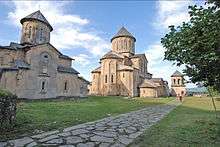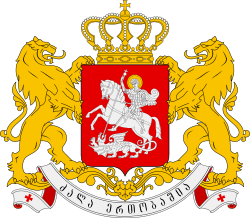Kutaisi
Kutaisi (/kuːˈtaɪsiː/,[3] Georgian: ქუთაისი [kʰutʰɑisi]) is one of the most ancient cities in the world and the third-most populous city in Georgia, traditionally, second in importance, after the capital city of Tbilisi. Situated 221 kilometres (137 miles) west of Tbilisi, on the Rioni River, it is the capital of the western region of Imereti.
Kutaisi ქუთაისი | |
|---|---|
-cropped.jpg) | |
 Flag  Seal | |

Kutaisi (Imereti) | |
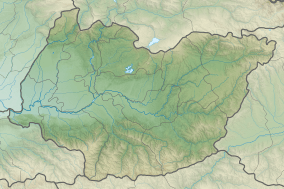 Kutaisi Kutaisi (Imereti)  Kutaisi Kutaisi (Georgia) 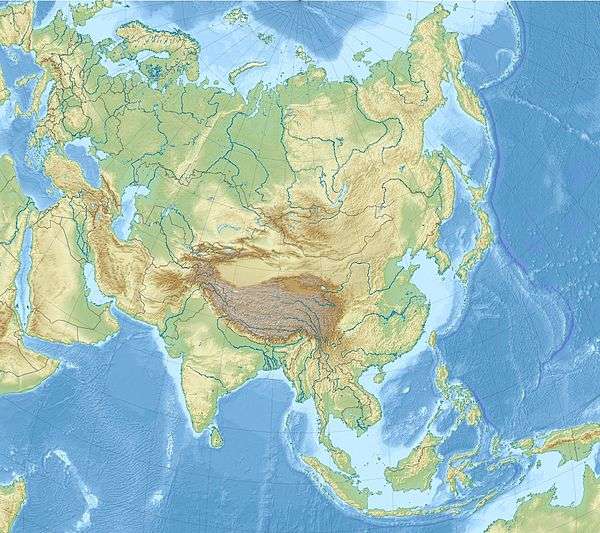 Kutaisi Kutaisi (Asia) | |
| Coordinates: 42°15′0″N 42°42′0″E | |
| Country | Georgia |
| Region (Mkhare) | Imereti |
| Established | 13th century B.C. |
| Government | |
| • Mayor | Giorgi Chighvaria [1] |
| Area | |
| • Total | 67.7 km2 (26.1 sq mi) |
| Elevation | 200 m (700 ft) |
| Population (2014 census) | |
| • Total | 147,635 |
| • Estimate (2019) | 138,191[2] |
| • Density | 2,200/km2 (5,600/sq mi) |
| Time zone | UTC+4 (Georgian Time) |
| • Summer (DST) | UTC+5 |
| Postal code | 4600 |
| Area code(s) | (+995) 431 |
| Climate | Cfa |
| Website | kutaisi |
Historically one of the major cities of Georgia, it served as political center of Colchis in the Middle Ages as capital of the Kingdom of Abkhazia[4] and Kingdom of Georgia and later as the capital of the Kingdom of Imereti. From October 2012 to December 2018, Kutaisi briefly was the seat of the Parliament of Georgia as an effort to decentralise the Georgian government.
History
Archaeological evidence indicates that the city functioned as the capital of the Colchis in the sixth to fifth centuries BC.[5] It is believed that, in Argonautica, a Greek epic poem about Jason and the Argonauts and their journey to Colchis, author Apollonius Rhodius considered Kutaisi their final destination as well as the residence of King Aeëtes.
Later, it was capital of the kingdom of Lazica until being occupied briefly by the Arabs. An Arab incursion into western Georgia was repelled by Abkhazians jointly with Lazic and Iberian allies in 736, towards c.786, Leon II won his full independence from Byzantine and transferred his capital to Kutaisi, thus unifying Lazica and Abasgia via a dynastic union. The latter led the unification of the Georgian monarchy in the 11th century.
From 1008 to 1122, Kutaisi served as capital of the united Kingdom of Georgia, and from the 15th century until 1810, it was the capital of the Imeretian Kingdom. In 1508, the city was conquered by Selim I, who was the son of Bayezid II, the sultan of the Ottoman Empire.
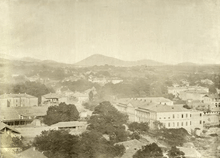
During the 17th century, Imeretian kings made many appeals to Russian Empire to help them in their struggle for independence from the Ottomans. All these appeals were ignored as Russia did not want to spoil relations with Turkey. Only in the reign of Catherine the Great, in 1768, were troops of general Gottlieb Heinrich Totleben sent to join the forces of King Heraclius II of Georgia, who hoped to reconquer the Ottoman-held southern Georgian lands, with Russian help. Totleben helped King Solomon I of Imereti to recover his capital, Kutaisi, on August 6, 1770.
Finally, the Russian-Turkish wars ended in 1810 with the annexation of the Imeretian Kingdom by the Russian Empire. The city was the capital of the Kutais Governorate, which included much of west Georgia. In March 1879, the city was the site of a blood libel trial that attracted attention all over Russia; the ten accused Jews were acquitted.[6]
Kutaisi was a major industrial center before Georgia's independence on 9 April 1991. Independence was followed by the economic collapse of the country, and, as a result, many inhabitants of Kutaisi have had to work abroad. Small-scale trade prevails among the rest of the population.
In 2011 Mikheil Saakashvili, the president of Georgia, signed a constitutional amendment relocating the parliament to Kutaisi.[7] On 26 May 2012, Saakashvili inaugurated the new Parliament building in Kutaisi. This was done in an effort to decentralise power and shift some political control closer to Abkhazia, although it has been criticised as marginalising the legislature, and also for the demolition of a Soviet War Memorial formerly at the new building's location.[8]
Geography
Kutaisi is located along both banks of the Rioni River. The city lies at an elevation of 125–300 metres (410–984 feet) above sea level. To the east and northeast, Kutaisi is bounded by the Northern Imereti Foothills, to the north by the Samgurali Range, and to the west and the south by the Colchis Plain.
Landscape
Kutaisi is surrounded by deciduous forests to the northeast and the northwest. The low-lying outskirts of the city have a largely agricultural landscape. The city centre has many gardens and its streets are lined with high, leafy trees. In the springtime, when the snow starts to melt in the nearby mountains, the storming Rioni River in the middle of the city is heard far beyond its banks.
Climate
Kutaisi has a humid subtropical climate (Cfa) with a well-defined on-shore/monsoonal flow (characteristic of the Colchis Plain) during the autumn and winter months. The summers are generally hot and relatively dry while the winters are wet and cool. Average annual temperature in the city is 14.8 degrees Celsius. January is the coldest month with an average temperature of 5.4 degrees Celsius while August is the hottest month with an average temperature of 24.7 degrees Celsius. The absolute minimum recorded temperature is −17.0 °C and the absolute maximum is 43.1 °C
Average annual precipitation is around 1,500 mm (59.06 in). Rain may fall in every season of the year. The city often experiences heavy, wet snowfall (snowfall of 30 cm/12 inches or more per single snowstorm is not uncommon) in the winter, but the snow cover usually does not last for more than a week. Kutaisi experiences powerful easterly winds in the summer which descend from the nearby mountains.
| Climate data for Kutaisi | |||||||||||||
|---|---|---|---|---|---|---|---|---|---|---|---|---|---|
| Month | Jan | Feb | Mar | Apr | May | Jun | Jul | Aug | Sep | Oct | Nov | Dec | Year |
| Record high °C (°F) | 22 (72) |
26 (79) |
32 (90) |
34 (93) |
37 (99) |
40 (104) |
42 (108) |
40 (104) |
40 (104) |
35 (95) |
29 (84) |
25 (77) |
42 (108) |
| Average high °C (°F) | 7.7 (45.9) |
8.9 (48.0) |
13.1 (55.6) |
18.2 (64.8) |
23.3 (73.9) |
26.4 (79.5) |
28.1 (82.6) |
28.9 (84.0) |
25.8 (78.4) |
21.3 (70.3) |
15.2 (59.4) |
10.3 (50.5) |
18.9 (66.0) |
| Daily mean °C (°F) | 5.2 (41.4) |
5.8 (42.4) |
8.4 (47.1) |
12.9 (55.2) |
17.9 (64.2) |
21.0 (69.8) |
23.2 (73.8) |
23.6 (74.5) |
20.5 (68.9) |
16.4 (61.5) |
11.5 (52.7) |
7.5 (45.5) |
14.5 (58.1) |
| Average low °C (°F) | 1.2 (34.2) |
1.8 (35.2) |
4.6 (40.3) |
7.7 (45.9) |
12.4 (54.3) |
15.9 (60.6) |
18.9 (66.0) |
19.5 (67.1) |
16.1 (61.0) |
11.9 (53.4) |
7.5 (45.5) |
3.5 (38.3) |
10.1 (50.2) |
| Record low °C (°F) | −17 (1) |
−14 (7) |
−10 (14) |
−3 (27) |
2 (36) |
7 (45) |
10 (50) |
10 (50) |
3 (37) |
−3 (27) |
−11 (12) |
−14 (7) |
−17 (1) |
| Average precipitation mm (inches) | 106 (4.2) |
129 (5.1) |
100 (3.9) |
112 (4.4) |
85 (3.3) |
105 (4.1) |
106 (4.2) |
86 (3.4) |
116 (4.6) |
108 (4.3) |
141 (5.6) |
139 (5.5) |
1,333 (52.5) |
| Average precipitation days (≥ 0.1 mm) | 11.7 | 13.8 | 13.8 | 13.3 | 12.1 | 11.9 | 13.6 | 11.6 | 10.8 | 10.3 | 11.8 | 14.5 | 149.2 |
| Average relative humidity (%) | 68 | 68 | 69 | 66 | 69 | 72 | 76 | 75 | 74 | 71 | 65 | 64 | 70 |
| Source: Deutscher Wetterdienst[9] | |||||||||||||
Population
| Year | Georgians | Jews | Armenians | Russians | Others | Total | |||||
|---|---|---|---|---|---|---|---|---|---|---|---|
| 1886[10] | 15,200 | 67.1% | 2.788 | 12.3% | 2,320 | 10.2% | 1,526 | 6.7% | % | 22,643 | |
| 1897[11][12] | 22,017 | 67.8% | 3,419 | 10.5% | 1,264 | 3.9% | 3,684 | 11.3% | % | 32,476 | |
| 1916[13] | 33,843 | 58.2% | 10,479 | 18% | 1,845 | 3.2% | 10,975 | 18.9% | % | 58,151 | |
| 1926[10][14] | 39,871 | 82.7% | 4,738 | 9.8% | 830 | 1.7% | 890 | 1.8% | % | 48,196 | |
| 1939[10][15] | 59,612 | 76.9% | 6,986 | 4.7% | 977 | 1.3% | 8,753 | 11.3% | % | 77,515 | |
| 1959[10][16] | 96,614 | 75.4% | 581 | 0.5% | 1,614 | 1.3% | 16,213 | 12.6% | % | 128,203 | |
| 1970[17] | 160,937 | ||||||||||
| 1979[18] | 194,297 | ||||||||||
| 1989[19] | 234,870 | ||||||||||
| 2002[20] | 181,465 | 97.6% | 613 | 0.3% | 2,223 | 1.2% | 1,664 | 0.9% | 185,965 | ||
| 2014[21] | 147,635 | ||||||||||
Culture
Kutaisi has an ancient cultural tradition. Here is a list of the cultural centers in Kutaisi.
.jpg)
.jpg)
Museums and other cultural institutions
1. Kutaisi State Historical Museum
2. Kutaisi Museum of Sport
3. Kutaisi Museum of Martial Art
4. Museum of Zakaria Paliashvili
5. Kutaisi State Historical Archive
6. Kutaisi State Scientific-Universal Library
7. Akaki Tsereteli State University
Theatres and cinema
1. Kutaisi Lado Meskhishvili State Academic Theatre
2. Kutaisi Meliton Balanchivadze State Opera House
3. Kutaisi Iakob Gogebashvili State Puppet Theatre
4. Cinema and Entertaining Center “Suliko”
5. Hermann-Wedekind-Jugendtheater
Professional unions and public organizations
- Georgian Writers’ Union
- Georgian Painters’ Union
- Folk Palace
Media
Local newspapers include: Kutaisi, Imeretis Moabe, PS, Akhali Gazeti, and Kutaisuri Versia. Other publications include Chveneburebi, a journal published by the Ministry of Diaspora Issues, and Gantiadi, a scientific journal.
TV: "Rioni"; Radio: "Dzveli Kalaki" (old City)
Also all the republican newspapers, journals and television stations have their representatives in Kutaisi.
Sport
Kutaisi has a great tradition in sports, with many famous sport clubs. FC Torpedo Kutaisi has participated on the highest level of the Soviet Union football league. After Georgia achieved independence, it won many domestic and international titles. RC AIA Kutaisi won the Soviet Championship several times in rugby, and after independence, national championships and cups. The women's football club FC Martve takes part at the 2017–18 UEFA Women's Champions League qualifying round after becoming champion in the Georgia women's football championship in 2016.[22] Kutaisi also has an influential basketball club BC Kutaisi 2010, 2016 Champion of the Georgian Superliga, which plays its home games at the Kutaisi Sport Palas.
Main sights
The landmark of the city is the ruined Bagrati Cathedral, built by Bagrat III, king of Georgia, in the early 11th century. The Gelati Monastery a few km east of the city, is a UNESCO World Heritage Site. One of the famous churches in Georgia is Motsameta monastery. It is named after two saints, brothers David and Constantine. They were the Dukes of Margveti, and were martyred by Arab invaders in the 8th century. Besides the churches, there are many interesting places in Kutaisi, such as: Sataplia Cave, where one can observe footprints of dinosaurs; Geguti Palace, which was one of the residences of Georgian monarchs; "Okros Chardakhi" – Georgian Kings’ Palace; and the Pantheon, where many notable citizens are buried. The Kutaisi Synagogue which was built in 1885 is also an interesting sight.
Economy
Auto Mechanical Plant is located in Kutaisi.
On April 2, 2009, the Georgian economy minister, Lasha Zhvania, announced that an Egypt-based home appliances producer company, Fresh Electric, intends to create a free industrial zone in Kutaisi.[23]
Transport
Airport
David the Builder Kutaisi International Airport (IATA: KUT, ICAO: UGKO) is an airport located 14 km (8.70 mi) west of Kutaisi. It is one of three international airports currently in operation in Georgia.
Railway
Kutaisi Rail Terminal has a direct connection with Tbilisi (Central). Line is served by Georgian Railways.
Local celebrations
"Kutaisoba" is the most important holiday in Kutaisi. It is celebrated on the second of May. On this day the population of Kutaisi crowds into the central park, with their children and celebrate together. Some people make masks and there are many kinds of performances, so it is a lot of fun. Also little children sell chamomiles. It is an old tradition, in the past ladies collected money for poor people, so today children also collect money for them.
On this day one can see traditional Georgian dances and you can hear folk music. Also it is an old tradition to go in the forest, which is near Kutaisi. Families barbecue and play games. On this day, people wear traditional clothes, choxa, so you can imagine that you are in past times. Also there is a new tradition of writing lyrics which have been written by writers from Kutaisi and then airplanes throw them from the sky. There is also a competition in different kinds of martial arts.
Notable natives
- Aeëtes – King of Kingdom of Colchis
- Bagrat III – King of united Kingdom of Georgia in 975–1014
- George I – King of united Kingdom of Georgia in 1014–1027
- Bagrat IV – King of united Kingdom of Georgia in 1027–1072
- George II – King of united Kingdom of Georgia in 1072–1089
- David IV – King of united Kingdom of Georgia in 1089–1125
- Veriko Anjaparidze – Georgian actress
- Revaz Gabriadze – cinematographer, writer, director, production designer
- Niko Nikoladze (1843–1928) – Georgian public figure
- Meliton Balanchivadze (1862–1937) – Georgian composer
- Zakaria Paliashvili (1871–1933) – Georgian composer
- Iakob Nikoladze (1876–1951) – Georgian sculptor, designer of the previous state flag of Georgia.
- Władysław Raczkiewicz (1885–1947) – first president of the Polish government-in-exile, 1939–1947
- Joseph Orbeli (1887–1961) – orientalist
- David Kakabadze (1889–1952) – Georgian painter
- Victor Dolidze (1890–1933) – Georgian composer
- Petre Otskheli (1907–1937) Georgian modernist set and costume designer
- Otar Korkia (1923–2005) – Georgian basketball player and coach (Olympic silver medalist as a player and European Champions' Cup winner as a coach)
- Dodo Chichinadze (1924–2009) – Georgian actress
- Revaz Dzodzuashvili (b. 1945) – Georgian football player, World Cup 1966 bronze medalist
- Zurab Sakandelidze (b. 1945) – Georgian basketball player, Olympic champion
- Mikheil Korkia (b. 1948) – Georgian basketball player, Olympic champion
- Meir Pichhadze (1955–2010) – Israeli painter, Kutaisi native
- Tengiz Sulakvelidze (b. 1956) – Georgian football player, played in 1982 FIFA World Cup, Euro 1988 silver medalist
- Ramaz Shengelia (1957–2012) – Georgian football player, played in 1982 FIFA World Cup
- Maia Chiburdanidze (b. 1961) – the seventh Women's World Chess Champion
- Besik Khamashuridze (b. 1977) – Georgian rugby player, won 53 caps, RC Aia Kutaisi player-coach
- David Khakhaleishvili (b. 1971) – Olympic champion in Wrestling
- Katie Melua (b. 1984) – A Georgian-British singer and songwriter that was born and grew up here.
International relations
Twin towns – sister cities












.svg.png)



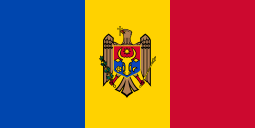


Cooperation agreements
Kutaisi has cooperation agreements with:[24]
| Wikimedia Commons has media related to Kutaisi. |
References
- Official Government site of Kutaisi Archived 2014-08-16 at the Wayback Machine
- https://www.geostat.ge/en/modules/categories/41/population
- "Kutaisi", Dictionary.com
- Bondyrev, Igor V; Davitashvili, Zurab V; Singh, V. P (2015). The geography of Georgia: problems and perspectives. ISBN 978-3-319-05413-1. OCLC 912320815.
- Gela Gamkrelidze. RESEARCHES IN IBERIA-COLCHOLOGY. Edited by David Braiind (Prof, of University of Exeter (UK)) // Olar LORDKIPANIDZE CENTRE OF ARCHAEOLOGY OF GEORGIAN NATIONAL MUSEUM. P. 43 "According to the data on archaeological excavations on the Gabashvili, Dateshidze and Ukimerioni hills in Kutaisi, an urban-type settlement of the 6-5 cent. BC was found to be concentrated"
- Effie Ambler, Russian Journalism and Politics: The Career of Aleksei S. Suvorin, 1861–1881 (Detroit: Wayne State University Press, 1972: ISBN 0-8143-1461-9), p. 172.
- Relocation of Next Parliament to Kutaisi Endorsed, Civil Georgia, Tbilisi, 21 June 2011.Retrieved: 24 November 2013.
- "Georgia opens new parliament in Kutaisi, far from the capital". Washington Post. 26 May 2012. Archived from the original on 2018-12-11. Retrieved 26 May 2012.
- "Klimatafel von Kutaisi / Georgien" (PDF). Baseline climate means (1961-1990) from stations all over the world (in German). Deutscher Wetterdienst. Retrieved 14 February 2016.
- "население грузии". Retrieved October 8, 2016.
- "Демоскоп Weekly – Приложение. Справочник статистических показателей". Archived from the original on August 18, 2016. Retrieved October 8, 2016.
- "Батумский округ 1897". Retrieved October 8, 2016.
- Caucasian Calendar, 1916. pp. 198-201
- http://www.ethno-kavkaz.narod.ru/kutaisi26.html
- http://www.ethno-kavkaz.narod.ru/kutaisi39.html
- http://www.demoscope.ru/weekly/ssp/ussr59_reg2.php
- http://www.demoscope.ru/weekly/ssp/ussr70_reg2.php
- http://www.demoscope.ru/weekly/ssp/ussr79_reg1.php
- http://www.demoscope.ru/weekly/ssp/sng89_reg2.php
- "Archived copy" (PDF). Archived from the original (PDF) on April 7, 2014. Retrieved October 8, 2015.CS1 maint: archived copy as title (link)
- http://census.ge/files/results/Census_release_ENG.pdf
- "FC Martve". UEFA. Retrieved 2017-08-10.
- Egypt-based Company Plans Free Industrial Zone in Kutaisi. Civil Georgia. April 2, 2009
- "Interrelations". kutaisi.gov.ge. Kutaisi. Retrieved 2020-02-13.
